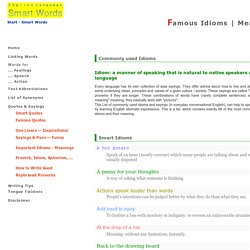

Home - The Globe and Mail. The 50 most important English proverbs. The 50 most important English proverbs What are proverbs?

Every culture has a collection of wise sayings that offer advice about how to live your life. These sayings are called "proverbs". How can you use proverbs to learn English? It's good to know the really common English proverbs because you hear them come up in conversation all the time. You know what they say: when the going gets tough... (Read #5 below to learn the rest of this proverb and what it means.) Learning proverbs can also help you to understand the way that people in English-speaking cultures think about the world. Proverbs can also give you good example sentences which you can memorize and use as models for building your own sentences. The most important English Proverbs This is a list of some of the most important and well-known English proverbs. The meanings of some of these phrases have shifted over the years, so a proverb might have originally had a different meaning than the one I explain.
Choose the Right Words in an Argument. When addressing a conflict with a colleague, the words matter.

Sometimes, regardless of how good your intentions are, what you say can further upset your coworker and just make the issue worse. Other times you might say the exact thing that helps the person go from boiling mad to cool as a cucumber. So, when things start to heat up with a colleague — you don’t see eye-to-eye on a project or you aren’t happy with the way you were treated in a meeting, for example — how can you choose your words carefully? To help answer this question, I talked with Linda Hill, the Wallace Brett Donham Professor of Business Administration at Harvard Business School and faculty chair of the Leadership Initiative. She is also the co-author of Collective Genius: The Art and Practice of Leading Innovation and Being the Boss: The 3 Imperatives for Becoming a Great Leader.
Hill explained that the words we use in confrontations can get us into trouble for three reasons: Phraseup* - find the right words. Find the Right Words - Words To Use. The 50 most useful Idioms and their Meaning - A list on 1 page. Commonly used Idioms Idiom: a manner of speaking that is natural to native speakers of a language Every language has its own collection of wise sayings.

They offer advice about how to live and also transfer some underlying ideas, principles and values of a given culture / society. These sayings are called "idioms" - or proverbs if they are longer. These combinations of words have (rarely complete sentences) a "figurative meaning" meaning, they basically work with "pictures". Smart Idioms A hot potato Speak of an issue (mostly current) which many people are talking about and which is usually disputed A penny for your thoughts A way of asking what someone is thinking Actions speak louder than words People's intentions can be judged better by what they do than what they say. Add insult to injury To further a loss with mockery or indignity; to worsen an unfavorable situation. At the drop of a hat Meaning: without any hesitation; instantly.
Back to the drawing board Ball is in your court. Attenuated. Confer. A doctor discovers an important question patients should be asked. This patient isn’t usually mine, but today I’m covering for my partner in our family-practice office, so he has been slipped into my schedule.

Reading his chart, I have an ominous feeling that this visit won’t be simple. A tall, lanky man with an air of quiet dignity, he is 88. His legs are swollen, and merely talking makes him short of breath. He suffers from both congestive heart failure and renal failure. It’s a medical Catch-22: When one condition is treated and gets better, the other condition gets worse. Hemodialysis would break the medical stalemate, but my patient flatly refuses it. Now his cardiologist has referred him back to us, his primary-care providers. With us is his daughter, who has driven from Philadelphia, an hour away. After 30 years of practice, I know that I can’t possibly solve this man’s medical conundrum. A cardiologist and a nephrologist haven’t been able to help him, I reflect, so how can I?
I pause, then look this frail, dignified man in the eye. That’s all? A doctor discovers an important question patients should be asked. Catch-22. Nebulous. Dote.